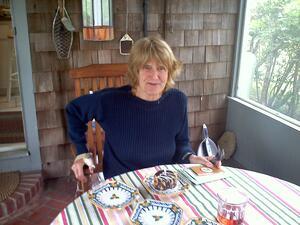Rosalyn Fraad Baxandall
Rosalyn Fraad Baxandall was my co-author on several books, my conscience and co-conspirator in all things feminist and political, and my very close friend. Ros, who died of cancer on October 13, 2015, at age 76, was one of the founders of the women’s liberation movement and a prominent activist for a range of social justice issues. Her rebellious spirit shaped her life from her school days to mere months before she passed away.
Ros was the last person anyone expected to die young: she was brilliant, vividly beautiful, tall, willowy, blonde, athletic, sexy, flirtatious. She was driven by values she inherited from her parents but equally by her own formidable stores of energy, a drive always directed outward—toward others, toward friendship, toward greater social justice. Her generosity and hospitality made her the center of intertwined communities: she brought people together and helped nurture the solidarity that we all need in these difficult times.
In late-1960s New York, Ros, along with her cohort of progressive women active in civil rights and anti-war politics, became a passionate feminist. She was among the first to grasp the importance and radicalism of feminist analyses of “personal” issues such as reproduction control, violence, body image, marriage, and love. Naturally charismatic, Ros became a prominent NYC spokesperson for the new women’s liberation movement. Her natural comfort with outspokenness, confrontation, even provocativeness made her unafraid to challenge standards of propriety. She was the first to testify at the rule-breaking speak-out for abortion rights in 1969. She supported women’s sexual freedom and the need for frank sex education at a time when these were radical views. She was a founder of the feminist groups New York Radical Women (established in 1967) and Redstockings (1969). Always attracted to the theatrical and the humorous, rejecting pomposity and sectarianism, she loved being part of No More Nice Girls and WITCH (Women’s International Terrorist Conspiracy from Hell), groups that engaged in provocative guerrilla theater. With her daring, her chutzpah, her athleticism, her many male lovers and her even greater number of enduring female friendships, she exemplified the complexities of a feminist form of freedom.
In 1971 Ros took a position in American studies at the State University of New York campus at Old Westbury, Long Island. She was a master teacher, becoming a full professor in 1990 and a Distinguished Teaching Professor in 2004, and was regularly chair of her department. She loved the insights she gained from her largely working-class students. She retired in 2009 and then taught part-time at the City University of New York’s Labor Studies Program and in a women’s prison, Bayview Correctional Facility in Manhattan.
Ros was also a pioneer women’s historian. In 1976 we published America’s Working Women, a collection of primary documents edited by Ros, me, and Susan Reverby. The book was published by Random House, largely through the support of Toni Morrison, who was then working as acquisitions editor there; always a feminist, Morrison backed our project from the beginning, well before publishers understood that there was a market for women’s history. In 1987 Ros published Words on Fire: the Life and Writings of Elizabeth Gurley Flynn (Rutgers University Press); in 1995 Ros and I created a completely revised second edition of America’s Working Women; and in 2000 she and Elizabeth Ewen published Picture Windows: How the Suburbs Happened (Basic Books), a comparative, gender-conscious study of middle-class and working-class Long Island suburbs. Most recently Ros and I published Dear Sisters: Dispatches from the Women’s Liberation Movement (Basic Books, 2001), still the only collection to include leaflets, manifestos, cartoons, posters, art, and even music from that movement. Through our agonized decisions about what to include and our curses about what we had to leave out, through arguments and hilarity and leaps into new insights, we enjoyed the work so much that we imagined ourselves producing ever-new volumes of Dear Sisters as the women’s movement was reshaped by new generations. We were planning yet another collaboration, a collection of the writings of Shulamith Firestone, when Ros became ill.
When she learned that she had an untreatable cancer, Ros immediately said she wanted to have a party. Her son Phineas Baxandall and his partner Sarah Hill, Ros’s grandchildren Julian and Nellie, and her informally adopted daughter Vicki Nichols made that party into a gala event at Ros’s house in Truro on Cape Cod. A hundred or so people made the trek to thank her for the leadership, inspiration, and friendship she had given us. Despite her weakness, she stayed upright and alert, sitting on a homemade “throne” in her yard under a huge canopy for over six hours, bestowing her wide grin on everyone.
In honor of Rosalyn Baxandall and her close colleague Barbara Joseph, a scholarship fund has been established at SUNY-Old Westbury to help more working-class students get a college education.




from an unceasing learner, my admiration for the fruitful work of that inspiring woman...